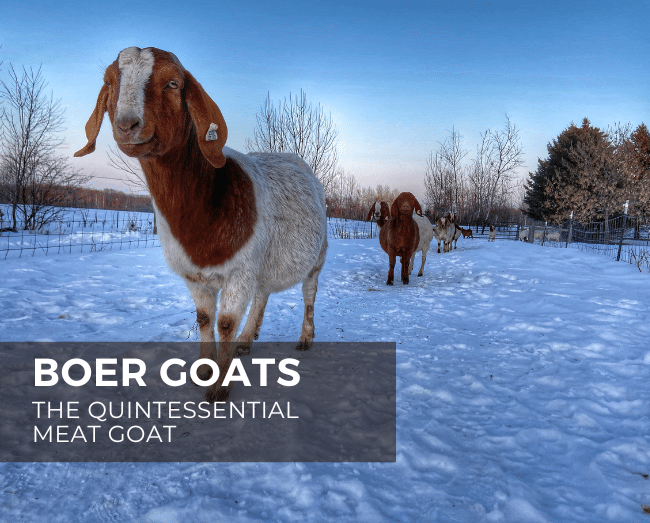When you think of meat goats, you most likely think of Boer goats first. This breed of goat is most recognizable with its distinctive red head and white body, as well as a popular meat goat breed in the U.S. Boer goats are highly valued for their large size.
This article will go over Boer goats in greater detail including identifying traits and characteristics.
Table of contents
History of the Boer goat
Originally developed by Dutch farmers in South Africa (the word “boer” is a Dutch word for farmer), Boer goats were introduced to the United States in 1993.
By this time the U.S. had lifted its restrictions on live imports of South African goats and sheep and the Boer goat stood apart from other meat goat breeds available at the time with a large frame, docile nature, and ability for rapid weight gain. Today, Boer goats are one of the most popular breeds of meat goats and are very popular as show goats.

Boer goat characteristics
Boer goats have many distinctive characteristics, including coloring and body size, among other traits.
Colors and coat
Boer goat colors will vary, however, they traditionally have a distinct reddish-brown head with a short-haired, white body.
Variations are common though and some Boer goats can be all red in color, have a black head or be all black in color, or be dappled with white spots all over.
Size
Boer goats are considered to be one the largest of the goat breeds. They have large frames with a deep chest and typically have quick and heavy, muscular growth.
Body weight: Bucks (adult males) can weigh anywhere from 200 to 340 pounds, while a mature doe (female goat) can range from 100-175 pounds in size.
Horns
Boer goats have large horns that curve backwards and hug close to their heads.
Ears
The Boer goat has distinct lop ears, which drop down alongside the face below the horns. In contrast, many breeds of goats have more erect ears, pointing up into the air.
Temperament
Boer goats are known for being docile in nature, even-tempered and easy to handle.
Hardiness
Boer goats are generally considered low-maintenance when it comes to management but are not as hardy as other breeds due to an overt focus on growth and large-framed meat goat production traits in the breed over the years.
This means Boers may tend to have more health issues when it comes to internal parasites and being raised on pasture, as compared to other meat production breeds, such as Kikos or Savannas. However, proper management of rotational grazing practices can help reduce parasite issues as well.
Boer goat uses
Boer goats make excellent meat goats due to their large size, muscular build, and low-fat content in their meat. Goat meat is typically the main purpose for this breed.
Where to buy Boer goats
A good place to start for souring Boer. goats is searching the American Boer Goat Association’s online database when looking for Boer goat breeders near me. You can also consult the Goat Rancher magazine directory which is organized by state.
- American Boer Goat Association
- Goat Rancher magazine Boer goat breeder listings
References:
- American Boer Goat Registry, History, Characteristics and Anatomy
- Oklahoma State University, Boer Goats
- USDA Goats Extension, Goat Breeds Boer
Related Posts:

LEAVE A COMMENT
Comments